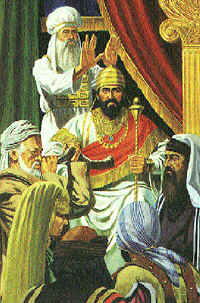The Bible: Types of Psalms
Royal Psalms
Scholars often refer to some of the psalms as “royal” psalms. These psalms are not all of one literary type, such as prayers of petition and songs of thanksgiving, but they are linked thematically by their emphasis on how God works through the office of king. The royal psalms can be subdivided into smaller groupings. For example, Psalm 45 is a royal wedding psalm; Psalms 46, 48, 87 and 122 concern the royal city, Zion or Jerusalem. We will concentrate on two categories of royal psalms: the Yahweh-Kingship psalms and the coronation psalms.
 |
| One coronation psalm proclaims, “The Lord will extend your mighty scepter from Zion; you will rule in the midst of your enemies. Your troops will be willing on your day of battle” (Psalm 110:2-3). Illustration by Larry Salk |
Psalm 47 exhibits the traits of the Yahweh-Kingship psalm, declaring, “How awesome is the Lord Most High, the great King over all the earth!” (verse 2). The psalmist praises God as the ruler over all nations, as the King par excellence: “God is the King of all the earth; sing to him a psalm of praise. God reigns over the nations; God is seated on his holy throne. The nobles of the nations assemble as the people of the God of Abraham, for the kings of the earth belong to God; he is greatly exalted” (verses 7-9).
Psalm 93 elaborates on the majesty of God as king: “The Lord reigns, he is robed in majesty; the Lord is robed in majesty and is armed with strength. The world is firmly established; it cannot be moved. Your throne was established long ago; you are from all eternity” (verses 1-2).
Psalms 96 – 99 continue the Yahweh-Kingship theme: “Say among the nations, ‘The Lord reigns’” Psalm 96:10); “The Lord reigns, let the earth be glad; let the distant shores rejoice…. Righteousness and justice are the foundation of his throne” (Psalm 97:1-2); “With trumpets and the blast of the ram’s horn — shout for joy before the Lord, the King” (Psalm 98:6); and “The Lord reigns, let the nations tremble; he sits enthroned between the cherubim, let the earth shake” (Psalm 99:1).
Articles in “Exploring the Word of God: Books of Poetry and Wisdom” |
While the Yahweh-Kingship psalms emphasize that Yahweh, the one true God, reigns supreme, the coronation psalms concern more particularly the role of the human king who reigns on the throne of David, and his relationship with God.
Psalm 2 is an excellent example of a coronation psalm. It describes the kings of the earth vainly banding together against God (verses 1-3). As in the Yahweh-Kingship psalms, God’s supreme kingship is praised: “The One enthroned in heaven laughs; the Lord scoffs at them” (verse 4).Then God declares, “I have installed my King on Zion, my holy hill” (verse 6). The king ruling on the throne of David was enthroned by God to fulfill his purpose. God tells the king, “You are my Son; today I have become your Father. Ask of me, and I will make the nations your inheritance, the ends of the earth your possession” (verses 7-8).
One coronation psalm proclaims: “The Lord will extend your mighty scepter from Zion; you will rule in the midst of your enemies. Your troops will be willing on your day of battle” (Psalm 110:2-3).
Psalm 72 is a coronation psalm connected with Solomon. It begins: “Endow the king with your justice, O God, the royal son with your righteousness. He will judge your people in righteousness, your afflicted ones with justice” (verses 1-2). The language used throughout this psalm is idealistic; it was never fulfilled by Solomon or any other king: “He will endure as long as the sun, as long as the moon, through all generations…. All kings will bow down to him and all nations will serve him…. All nations will be blessed through him, and they will call him blessed” (verses 5, 11, 17).
These coronation psalms describe the king as God’s son, and picture him ruling with unlimited justice and power — the same way God is portrayed in the Yahweh-Kingship psalms. No human king could ever fulfill these psalms; they ultimately point to Jesus Christ, the King of kings, who will reign forever (Revelation 11:15; 19:16).
 Songs of confidence
Songs of confidence
Songs of confidence are aptly named — the individual or community expresses its confidence and trust in the ever-reliable God. Psalm 16, for example, begins: “Keep me safe, O God, for in you I take refuge” (verse 1).
The most famous song of confidence is undoubtedly Psalm 23: “Even though I walk through the valley of the shadow of death, I will fear no evil, for you are with me” (verse 4). The same sentiment is expressed by the community in Psalm 46: “God is our refuge and strength, an ever-present help in trouble. Therefore we will not fear, though the earth give way and the mountains fall into the heart of the sea, though its waters roar and foam and the mountains quake with their surging. Selah” (verses 1-3).
As we have already noted, the term selah marks the end of a strophe or section of the song. Psalm 46 — which could also be classified as a “Zion hymn,” a subcategory of the royal psalms — is divided into three strophes. The last two stanzas end by reconfirming the community’s absolute trust in God: “The Lord Almighty is with us; the God of Jacob is our fortress. Selah” (verses 7, 11). This is an inspiring message for Christians, whom the apostle Paul reminds, “If God is for us, who can be against us?” Romans 8:31).
In Psalm 52, David contrasts the security of his trust in God with Doeg’s misplaced trust in riches: “The righteous…will laugh at [Doeg], saying, ‘Here now is the man who did not make God his stronghold but trusted in his great wealth and grew strong by destroying others!’ But I am like an olive tree flourishing in the house of God; I trust in God’s unfailing love for ever and ever” (verses 6-8).
Psalm 62 is another song of confidence divided into three strophes. In this psalm, David describes God metaphorically as “my rock and my salvation” (verses 2, 6). As we face the uncertainties of life, these psalms encouragingly point us toward the great God who can be relied upon absolutely (Deuteronomy 31:6).
Wisdom Psalms
The wisdom psalms contain teachings and principles that are similar to those in the book of Proverbs, but they are expressed in the form of psalms. The wisdom psalms give instruction: “Refrain from anger and turn from wrath; do not fret — it leads only to evil” (37:8). The wisdom psalms state general principles: “Better the little that the righteous have than the wealth of many wicked” (verse 16). They praise God’s law: “The law of the Lord is perfect, reviving the soul. The statutes of the Lord are trustworthy, making wise the simple” (Psalm 19:7). They speak about wisdom: “The fear of the Lord is the beginning of wisdom; all who follow his precepts have good understanding” (Psalm 111:10).
Psalms 37, 111 and 112 are wisdom psalms with an acrostic pattern; each verse begins with successive letters of the Hebrew alphabet. This pattern made the psalms easier to recite.
The wisdom psalms, like Proverbs, give an ideal picture. The person who delights in God’s law “is like a tree planted by streams of water, which yields its fruit in season and whose leaf does not wither. Whatever he does prospers” (Psalm 1:3). By contrast, the wicked “are like chaff that the wind blows away” (verse 4). Another psalm describes the God-fearing person: “Wealth and riches are in his house, and his righteousness endures forever” (Psalm 112:3). These psalms give general principles, not absolute laws. This type of teaching will be explained in more detail in our commentary on Proverbs.
|
Acrostic psalms do not have a common purpose in the same way as do the hymns of praise or the prayers of petition. Certain acrostic psalms adhere more completely to the acrostic pattern than others. Essentially, an acrostic poem begins with the first letter of the Hebrew alphabet and the succeeding lines begin with successive letters of the alphabet. Growing up in Western society, where poetry traditionally has a set meter and frequently a rhyming scheme, we may fail to appreciate an important role the acrostic plays in biblical poetry. Imposing an acrostic structure on a poem may either serve as a memory aid or prevent the emotional aspects of the poem from descending into an incoherent jumble of words. Just as the sentences in this box are somewhat contrived, so the acrostic psalms sometimes sound artificial. Lamentations is particularly highly structured: Each of the first four chapters is an acrostic poem, the third chapter being a triple acrostic. Not every acrostic poem has lines that correspond to the verses in our Bible. Psalm 119 is the supreme example of a multiple acrostic poem; it has eight verses beginning with the first letter of the alphabet, then eight verses beginning with the second letter and so on. Quite a few of the acrostic psalms, including Psalm 119, are connected with wisdom motifs, such as the majesty of God’s law. The acrostic psalms can be appreciated on their own merit even without knowledge of the acrostic pattern. While we would like to complete our own acrostic in this section, we cannot find any sensible conclusion, so here is what we came up with instead. Xylophones might be used in modern hymn services, but possibly did not exist in ancient Israel, which explains why most scholars do not believe they were used originally in the performance of acrostic psalms. |

